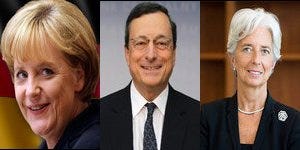Europe Sows Austerity and Reaps Default

The Greeks have made their decision by a wide majority. What happens now is anyone’s guess. That will no doubt be framed by ego and nailed to the wall of face-saving, but it need not be that way.
Greece presents an enormous opportunity for the European Union and European growth and stability, if only they recognize it for what it is.
The big question for the EU, ECB and IMF is precedent. What the hell happens if we change precedent? How frightening and we do not want to be frightened. What are the ramifications to Spain, Portugal, Italy and the demonstrably weaker southern nations of the Union?
It scares them to death. It need not. The present system of austerity (at any price) is weakening Europe and driving its members apart. Britain is a prime example of a (relatively) strong nation wanting to be elsewhere. Angela Merkel’s Germany is the last guy standing in a field of the 28 politically-economically strung together members.
Strung together is an apt term—gallows-humor, as in “we either hang separately or all together.” Hanging by a thread (or by your thumbs, depending upon circumstance) is not where individuals or nations want to be. So, let’s discuss a solution.
In my mind there are two types of debt. One is to patch over failing social programs and corrupt governments. It comes at increasingly high interest-rates and very little with which to service that debt—a death spiral within which Greece and a number of other nations suffer.
The second is investment to finance actual stuff—things that remain of enduring value after the money is long gone. Infrastructure, research and development centers, small-business financial support and the undoing of government red-tape that stifles entrepreneurs are all examples of investment rather than loans.
A discussion of investment begs the definition of investors.
Governments and private capital invest in job production. A product comes from that. The product may be happiness, security and hope on family and educational levels. It may be result in greater international competitiveness, but it is no less a product for that.
The investor community, which I define (for simplicity here) as world-wide stock and bond traders, simply gamble for profit. Their purchases and sales add absolutely nothing to an economy other than their personal or institutional profit or loss. They are amoral (as distinguished from immoral), having no skin in the game because a sense of moral standards or principles is not a balance-sheet item. The money in which they deal could be replaced in an instant at zero interest by governments (or communities of governments).
The European Central Bank (ECB) is indeed a bank and has ignorantly (but understandably) made banks well at the expense of citizens. It’s president, Mario Draghi chose ‘quantitative easing’ for European banks in lieu of development funds—another example of paying off banks’ bad debt at the expense of citizens.
It seemed to have worked in America, although both Nobel economists (Joe Stiglitz and Paul Krugman) argue otherwise. The US stock markets did double, so Draghi (having no brighter idea) came in five years too late to rescue his own banks. Greece, Portugal, Italy and Spain be damned—they got the same reward as the American taxpayer.
The International Monetary Fund, an organization that has destroyed more international economies than any national banking system, is a driver of Greek austerity as well. The IMF, currently headed by Christine Lagarde, is a rat-fuck of financial pressure by wealthy international members to keep their poorer members poor. Their current target is Europe and they are doing very well at their appointed task.
And then there’s Germany under the straitlaced and stone-faced Angela Merkel. One wonders if Merkel fears any EU country challenging Germany’s status as their cumulative headmaster.
Lagarde, Draghi and Merkel have a once-in-a-century opportunity at their command—to bring Europe out of lingering recession and make of it an international powerhouse.
Greek premier Alexis Tsipras and his newly resigned Finance Minister, Yanis Varoufakis, do not want Greece to remain as it was. By overwhelming victory in the ‘No’ vote, Greeks agree with them. Greece is willing as never before to be changed, but not to be destroyed by unending austerity and despair. How the Troika chooses to deal with this will set a template for the very existence of the European Union.
Merkel, Draghi and Lagarde can choose to open the gates of investment in Europe and close it off from the shriveling power of investors. It will take energy, imagination, foresight, clarity of purpose, a stand-down of former publicly held opinions and very close cooperation with Alexis Tsipras and whoever he chooses as Finance Minister.
That’s a tall order—more the territory of statesmen than politicians. Unfortunately for history, each member of this aptly named Troika is a devoted and skilled politician.
I rather expect that in the weeks, months and years ahead, the Troika will continue to be powered by these three horses—all straining at the bit in diverse and self-serving directions. Under those circumstances, Europe is bound to follow Britain into obscurity—victim of its own form of failed colonialism.
